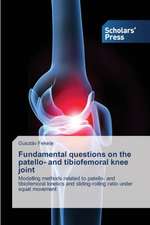Variability in Human Performance: Human Factors and Ergonomics
Autor Thomas J. Smith, Robert A. Henning, Michael G. Wade, Thomas Fisheren Limba Engleză Paperback – 29 mar 2017
An exploration of the link between variability and related processes, the book introduces a comprehensive framework for understanding human performance variability, presented in terms of how human control of behavior is closely tied to design factors in the performance environment. The authors introduce empirical evidence, as well as practical examples and application areas, in support of this framework. The book begins with coverage of neurobiological and biomechanical basis of movement variability, then examines rich and extensive empirical evidence available for context specificity in cognitive performance and learning, as a basis for cognitive performance variability. The book then reviews the evidence for context specificity in:
- Student learning
- Displaced feedback conditions
- Human error behavior
- Affective performance
- Social and team performance
| Toate formatele și edițiile | Preț | Express |
|---|---|---|
| Paperback (1) | 355.07 lei 6-8 săpt. | |
| CRC Press – 29 mar 2017 | 355.07 lei 6-8 săpt. | |
| Hardback (1) | 855.59 lei 6-8 săpt. | |
| CRC Press – 26 aug 2014 | 855.59 lei 6-8 săpt. |
Din seria Human Factors and Ergonomics
- 8%
 Preț: 580.61 lei
Preț: 580.61 lei - 25%
 Preț: 939.36 lei
Preț: 939.36 lei - 18%
 Preț: 701.56 lei
Preț: 701.56 lei - 32%
 Preț: 1224.67 lei
Preț: 1224.67 lei - 18%
 Preț: 820.33 lei
Preț: 820.33 lei - 15%
 Preț: 613.49 lei
Preț: 613.49 lei - 20%
 Preț: 466.24 lei
Preț: 466.24 lei -
 Preț: 492.09 lei
Preț: 492.09 lei - 15%
 Preț: 461.87 lei
Preț: 461.87 lei - 15%
 Preț: 606.55 lei
Preț: 606.55 lei - 15%
 Preț: 567.08 lei
Preț: 567.08 lei - 28%
 Preț: 439.80 lei
Preț: 439.80 lei - 23%
 Preț: 427.84 lei
Preț: 427.84 lei - 27%
 Preț: 436.29 lei
Preț: 436.29 lei - 22%
 Preț: 333.29 lei
Preț: 333.29 lei -
 Preț: 504.99 lei
Preț: 504.99 lei - 22%
 Preț: 402.77 lei
Preț: 402.77 lei - 11%
 Preț: 320.94 lei
Preț: 320.94 lei - 18%
 Preț: 788.77 lei
Preț: 788.77 lei - 18%
 Preț: 787.97 lei
Preț: 787.97 lei - 18%
 Preț: 1141.42 lei
Preț: 1141.42 lei - 18%
 Preț: 1814.36 lei
Preț: 1814.36 lei - 18%
 Preț: 1336.94 lei
Preț: 1336.94 lei - 18%
 Preț: 808.50 lei
Preț: 808.50 lei - 11%
 Preț: 320.72 lei
Preț: 320.72 lei - 10%
 Preț: 324.91 lei
Preț: 324.91 lei - 20%
 Preț: 737.66 lei
Preț: 737.66 lei - 28%
 Preț: 1430.95 lei
Preț: 1430.95 lei - 28%
 Preț: 907.87 lei
Preț: 907.87 lei - 29%
 Preț: 2000.24 lei
Preț: 2000.24 lei - 28%
 Preț: 497.12 lei
Preț: 497.12 lei - 26%
 Preț: 1261.79 lei
Preț: 1261.79 lei - 19%
 Preț: 461.48 lei
Preț: 461.48 lei
Preț: 355.07 lei
Preț vechi: 455.79 lei
-22% Nou
Puncte Express: 533
Preț estimativ în valută:
67.96€ • 73.85$ • 57.13£
67.96€ • 73.85$ • 57.13£
Carte tipărită la comandă
Livrare economică 21 aprilie-05 mai
Preluare comenzi: 021 569.72.76
Specificații
ISBN-13: 9781138076020
ISBN-10: 1138076023
Pagini: 389
Ilustrații: 61
Dimensiuni: 156 x 234 mm
Greutate: 0.57 kg
Ediția:1
Editura: CRC Press
Colecția CRC Press
Seria Human Factors and Ergonomics
ISBN-10: 1138076023
Pagini: 389
Ilustrații: 61
Dimensiuni: 156 x 234 mm
Greutate: 0.57 kg
Ediția:1
Editura: CRC Press
Colecția CRC Press
Seria Human Factors and Ergonomics
Public țintă
Academic and Professional Practice & DevelopmentCuprins
Introduction. Variability in Human Motor and Sport Performance. Variability in Cognitive and Psychomotor Performance. Educational Ergonomics - Context Specificity in Student Learning. Variability in Human Performance under Displaced Sensory Feedback. Human Error and Performance Variability. Variability in Affective Performance. Social Cybernetics of Team Performance Variability. Variability in Human Work Performance - Interaction with Complex Sociotechnical SystemsVariability in Human Performance Variability – An Evolutionary PerspectiveSummary and Conclusions. Summary. Conclusions – The Purpose of Human Performance Variability.
Recenzii
"Throughout, the book focuses on the sources of variability in human performance, including the design of work systems. The book will therefore be of interest to a wide range of HFE specialists."
—RS Bridger, Institute of Naval Medicine
"This is a truly excellent book that increases awareness of the study of variability in movement performance. … Importantly, this book provides exciting discussions on theoretical problems on movement variability such as what are the sources of this variability."
—DR. Nick Stergiou, University of Nebraska Omaha and University of Nebraska Medical Center
—RS Bridger, Institute of Naval Medicine
"This is a truly excellent book that increases awareness of the study of variability in movement performance. … Importantly, this book provides exciting discussions on theoretical problems on movement variability such as what are the sources of this variability."
—DR. Nick Stergiou, University of Nebraska Omaha and University of Nebraska Medical Center
Notă biografică
Thomas J. Smith has research and teaching experience and funding support encompassing many areas of human factors/ergonomics, including human performance variability, educational ergonomics, human error and hazard management, occupational ergonomics, occupational health and safety, surface transportation, occupancy quality, patient safety, work physiology, kinesiology, and ergonomics certification systems. He is a research associate with the School of Kinesiology, University of Minnesota. He is a Certified Human Factors Professional with over 100 publications.
His honors include serving as senior editor for a recent special issue of Ergonomics in Design dealing with the topic of globalization of ergonomics, serving as chair of the Professional Standards and Education Standing Committee for the International Ergonomics Association (IEA), originator and committee member for the IEA K.U. Smith Student Award, editorial board member for the journal Theoretical Issues in Ergonomics Science, director and past president of the Human Factors and Ergonomics Society (HFES) Upper Midwest Chapter, general chair for the 2001 HFES Annual Meeting, member of the 2002 State of Minnesota Ergonomics Task Force, and member of the Dakota County (Minnesota) University of Minnesota Extension Committee.
Robert A. Henning is an associate professor of industrial/organizational psychology at the University of Connecticut. He holds degrees from the University of Wisconsin-Madison in psychology (BS), biomedical engineering (MS), and industrial engineering (PhD). He also received three years of postdoctoral training at the National Institute for Occupational Safety and Health (NIOSH) in a fellowship program administered by the National Research Council. He is a board-certified professional ergonomist. Since 2006, he has been an active researcher in the Center for the Promotion of Health in the New England Workplace where he conducts research on programs
His honors include serving as senior editor for a recent special issue of Ergonomics in Design dealing with the topic of globalization of ergonomics, serving as chair of the Professional Standards and Education Standing Committee for the International Ergonomics Association (IEA), originator and committee member for the IEA K.U. Smith Student Award, editorial board member for the journal Theoretical Issues in Ergonomics Science, director and past president of the Human Factors and Ergonomics Society (HFES) Upper Midwest Chapter, general chair for the 2001 HFES Annual Meeting, member of the 2002 State of Minnesota Ergonomics Task Force, and member of the Dakota County (Minnesota) University of Minnesota Extension Committee.
Robert A. Henning is an associate professor of industrial/organizational psychology at the University of Connecticut. He holds degrees from the University of Wisconsin-Madison in psychology (BS), biomedical engineering (MS), and industrial engineering (PhD). He also received three years of postdoctoral training at the National Institute for Occupational Safety and Health (NIOSH) in a fellowship program administered by the National Research Council. He is a board-certified professional ergonomist. Since 2006, he has been an active researcher in the Center for the Promotion of Health in the New England Workplace where he conducts research on programs
Descriere
This book introduces a comprehensive framework for understanding human performance variability in terms of how human control of behavior is closely tied to design factors in the performance environment. Empirical evidence, as well as practical examples and application areas, introduced in support of this framework. The book provides suggestions on how individuals, groups, and organizations can significantly reduce variability in human performance that often leads to systems failures.
























